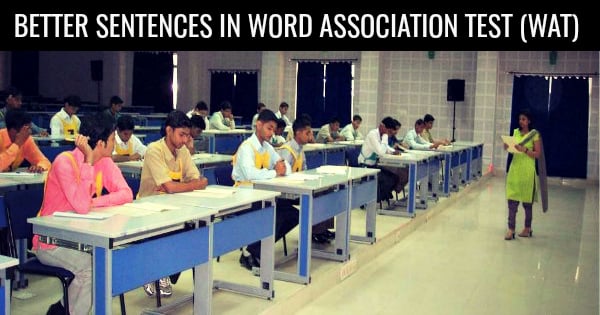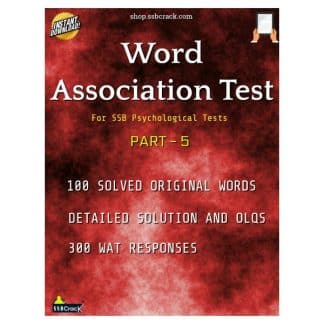Word Association Test (WAT) is one of the projective approaches which is employed by psychologists for their clinical diagnosis. It is a test of the personality, imagination and mental function of the candidate. The candidates are presented with a list of words, one at a time and asked to respond with the first idea or thought that strikes their mind. This test is also known as idea writing test.
The words in WAT are designed and arranged in a manner to attract the spontaneous reaction of the candidate, which helps the psychologist read a candidate’s personality traits. Each candidate has a different perception of a given word and on its basis, he associates his thoughts with that word. These thoughts are influenced by his environment.
For the same word; different feelings, thoughts, and reactions may be aroused or triggered in different people. With the help of this test, the psychologist understands or gets a fair idea of the candidate’s personality, his likes and dislikes, achievements, emotional attitudes and temperament.

Personality traits like Initiative, Loyalty, Liveliness, Leadership, Adaptability, Cooperative Spirit, Intelligence, Courage, Determination, Team Spirit, Spirit of adventure, Hard work, Organizational ability, Sociability, Resourcefulness, Self-confidence, Fearlessness, Sense of justice, Sense of duty and responsibility, Unselfishness (all a part of OLQs) are reflected by a candidate’s response.
Some tips to form better sentences in Word Association Test (WAT)
- Be spontaneous, and not studied: Your response should be voluntary and unconstrained. You may forget the mugged up sentences, your spontaneous reactions reflect your qualities whether you are fit to be an officer or not. Remember it is not a test of language but personality.
- Practice helps: It is always useful. It helps you in making the right and quick response to words set for WAT with spontaneity. You will be able to avoid pitfalls in the SSB tests if you have done some practice for WAT exercises.
- Selection of words: The SSBs select such words for WAT that bring out particular officer like qualities. The words can be of two types-
A. Knowledge based- Words in this category imply observational sentences. Not necessarily they trigger any spontaneous stimuli and are conventional in type. For example- Missile, Atom, Keyboard, Ice, Kitchen, Money, Diamonds etc. B. Character based- Words in this category activate and stimulate your responses. You demonstrate your OLQs mostly from these type of words. For example Peace, Love, Anger, Brave, Admire, Initiative, Think, Youth, etc.
So practice more with such kind of words and analyse yourself with OLQ list. Within a few days, you will notice changes in your pattern of responses which also reflect in your normal life. Also, do not try to associate every word with Defence career, it only indicates the psychologist that the reactions are not natural and the candidate has been wrongly coached. - Write short, crisp and meaningful: Write simple and brief sentences to save time. There is no need to use articles in every sentence. Make meaningful and logical sentences, don’t use a lot of imaginary power, your sentences must be real and grounded.
- Free of grammatical errors & legible handwriting: Write grammatically correct sentences and maintain a good handwriting. This is a test of pressure, your ability to stay calm and composed is revealed from your written work. A candidate struggling to write sentences with a poor handwriting and scribbling responses is more likely to be knocked off from the pressure of the test.
- Creativity & Originality: When a word flashes on the screen, record the first image that comes to your mind associated with that word. This is your original idea of the word. Now write a positive sentence from that word or relate it to a story and jot it down on your answer sheet.
- Do not use modal verbs: Remember not to use words like can, could, may, might, should, must, ought to. They express likelihood, ability or permission and form the basis of imaginary sentences.
- Use remedial or denial approach for negative words: Never form sentences showing negative traits like pessimism, anti-social feelings. In Remedial approach, a remedial or curative word is used as a starting word showing its remedial effect for the negative word. In Denial approach, along with the negative word, denial expression is used to deny the existence of the negative word in one’s ideas. In this technique, words like no, never, do not, not, etc can be used to form sentences.
For example- Hate
Using denial approach: Never pays in a relationship.
Using remedial approach: Love overcomes hatred. - In case of less time or Inability to complete a sentence: If you fall short of time or if, for some words, you are not able to form full sentences, just write your idea or immediate reaction about that sentence in a word or two. The psychologist will understand what you want to convey. For example, for the word Sports, if you are unable to complete the sentence in time, just write “adventurous“. The psychologist will derive the conclusion that by adventurous you mean to convey something about adventurous sports or that sports are adventurous.
- The last thing about succeeding in WAT is always try to demonstrate and express positive attitude with the feeling of determination and dedication.









![AFCAT 1 2018 ONLINE REGISTRATION [UPDATES]](https://www.ssbcrack.com/wp-content/uploads/2017/12/AFCAT-1-2018-ONLINE-REGISTRATION-UPDATES-150x150.jpg)




